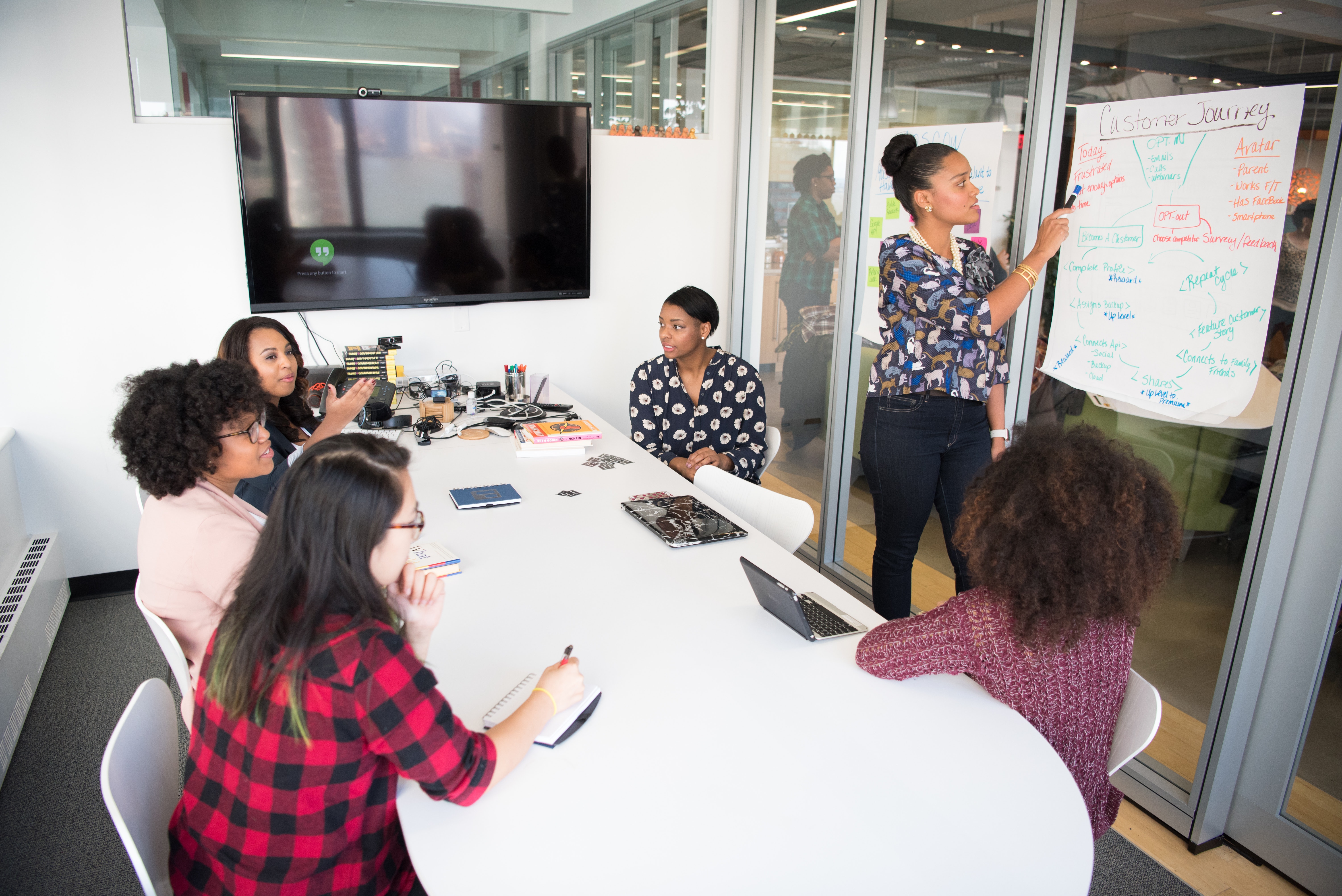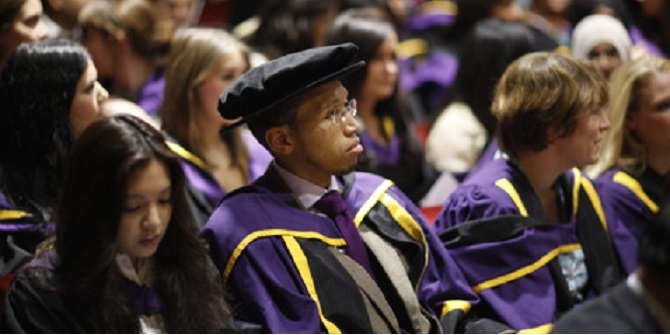PhD students and Early Career Researchers face barriers when contemplating commercial sector engagement. LSE Generate and the LSE Doctoral Training Partnership designed an event to facilitate an honest and open discussion exploring the issues arising for PhD students and Early Career Researchers venturing outside of academia. This event was part of the LSE ABC (Accelerating Business Collaboration) programme, funded by a grant awarded by the ESRC to the LSE Doctoral Training Partnership.
Here Maria Kramer reviews the event, and share insights from the discussion.
Jane Murray and Dr Lawrence Ampofo spoke about connecting with The Other Side.
 Jane Murray (pictured left) is an entrepreneur and strategic mentor as well as a lawyer and former VC with experience of managing PhD research in the private sector and of liaising industry and academia with all its challenges.
Jane Murray (pictured left) is an entrepreneur and strategic mentor as well as a lawyer and former VC with experience of managing PhD research in the private sector and of liaising industry and academia with all its challenges.

Dr Lawrence Ampofo (pictured right) is the founder of a digital ethics company which works with organisations to create responsible and ethical digital experiences. He regularly publishes research on the ethical technology landscape and has a PhD in Politics and International Relations.
What’s on “The Other Side” – does social science expertise have a value for the commercial sector?
There exists a significant demand for skills and social science expertise on “the other side”. As Jane Murray emphasised, companies, especially those in the process of scaling up, are often keen on getting researchers involved and adding the “halo of science” to their organisations. A surprising insight was that such sought-after research expertise is not confined to STEM or quantitative skill sets but includes more qualitative, social science expertise as for instance held by anthropologists or sociologists. Often, however, researchers and PhD students are little aware of the value attributed to their skills within the private sector. Mutual distrust and a strong sense of a “schism” separating academia and the commercial sector are nurtured on both sides. This can render engagement and exchange between academia and the commercial sector tricky.
Companies interested in tapping into social science expertise may find it hard to access and to establish relationships with research institutions. PhD students and Early Career Researchers, on the other hand, often lack an awareness of the applicability and value of their research expertise beyond academia or they may lack the skills needed to frame themselves and their research projects in terms understandable to non-academic, commercial audiences. What is needed, Jane suggested, is not only a de-mystification of the private sector for academics and a parallel de-mystification of academia for those within the business world. What is needed is also support from within research institutions to help PhD students in building up confidence regarding the value of their PhD skills and research expertise beyond academia.
From PhD project to developing a “Unique Selling Point” (USP) – framing research expertise for businesses
Dr Lawrence Ampofo shared his own experiences of bridging the schism and becoming a PhD-graduate-turned-entrepreneur. He outlined three main steps for PhD researchers interested in business engagement to effectively communicate and establish relationships with the commercial sector:
- Start thinking about your research expertise in new ways, i.e. as a USP.
Lawrence recommended that PhD students who wish to engage with or transition to the commercial sector should start thinking about themselves as “more than students” and start seeing themselves as research experts. Bridging the gap, he emphasised, requires PhD students to adopt a different language and “think about themselves and their work as a brand” and explore ways “to manage and push out that brand, making it useful in other people’s minds”. - Get a sense of how your research expertise fits within the wider business landscape.
Commercial organisations, Lawrence emphasised, value what you are learning as a PhD student and how you are learning, i.e. the deep, specific content of research as well as the skill sets that come with being a researcher. Finding out how to place specific research expertise within the landscape of the commercial sector is a learning process. It takes time to figure out the right kind of fit as PhD research projects are unique and specialised in character. However, many companies act on horizontal, wide expertise and place great value on the complementary deep and impactful expertise that PhD researchers can bring. - Develop confidence about being a “senior expert” and claim your expertise.
Companies may wish to protect their commercial relationships and confine PhD researchers to the role of “student” or “subordinate” who has to deliver a certain piece of work. PhD researchers should be confident about claiming their research expertise and consider themselves as “senior experts” who add value to the company through their research. Developing the confidence to recognise the commercial value of one’s expertise and figuring out how to effectively broker expertise in commercial relationships will take time. It’s as much part of the learning process as is recognising the rolling demand that the commercial sector has for research skills and how one’s expertise may sit within that sector.
Step by step – how to start reaching out
Building the confidence to reach out to business stakeholders, manage commercial relationships and broker unique research expertise doesn’t happen overnight. The words “learning process” were repeated numerous times by participants. But where does one start as a PhD student who is curious to explore opportunities within the commercial sector? What resources are available? How do you start conceptualising research as something that can add value to a commercial organisation?
Several starting points and suggestions for reaching out and learning to bridge the schism were voiced by the discussion participants. These included:
- seeking exposure: Venturing beyond one’s comfort zone and reaching out to the commercial sector as an academic may be a daunting prospect but one can start small and build up gradually. Conferences and events organised by commercial organisations can give insights into expertise and skills which companies in a particular sector of interest are looking for. Small-scale internship, placement or work shadowing opportunities offer space for exploration and experimentation without requiring commitment to a non-academic career, while networking events create a chance to forge connections and learn from others.
- disseminating research and expertise: PhD students are familiar with academic publications and academic conference presentations as the primary pathways for disseminating their research expertise among academic audiences. However, these pathways are often insufficient to reach out to more diverse audiences, especially commercial ones. Writing a blog or creating a podcast to communicate research interests are excellent additional means of dissemination to familiarise a wider audience with areas of expertise.
- anticipating the challenges and making use of resources: Finishing a PhD project within a limited timeframe, while juggling often precarious financial conditions and struggling with the draining effects of isolation, lacking structure and constant self-doubting, is a huge challenge of its own. Learning to adopt an entrepreneurial or commercial mind-set and developing the skills to initiate and manage commercial relationships easily adds another set of expectations to already tight PhD and postdoctoral schedules.
No entrepreneurial journey is without its experiences of failure and rejection (and the psychological burden they generate), although those experiences are all too easily rendered invisible by the current hype surrounding entrepreneurs and start-ups. There is no easy answer as to how those conflicting demands on PhD and Early Career Researchers can be resolved. Crucial is the provision of support and resources as part of the PhD training process which can assist PhD students in acquiring the skills needed for navigating the (commercial) landscape beyond academia.
While participants identified a clear need for expanding support services in the future, LSE offers a rich support infrastructure which PhD students with an interest in entrepreneurship and the commercial sector can already tap into.
LSE Generate and LSE Careers regularly run events in cooperation with the PhD Academy to facilitate business engagement and create exchange between the LSE PhD community and LSE graduates with commercial experience (including future ABC events!). As the School’s home for entrepreneurship, LSE Generate supports students and alumni in their entrepreneurial journeys. LSE Innovation is the place to go for support concerning research innovation and commercialisation. Further opportunities for researchers and entrepreneurs to connect are offered by the LSE Lean Accelerator and Zinc.
What’s next?
Working in close collaboration with these different LSE services, the PhD Academy is committed to further encourage research-business-collaboration and knowledge exchange across the “schism”. As part of the LSE Generate x LSE ABC event series, further events are planned to take place in the 2020-21 academic year to facilitate commercial sector insights for PhD students and Early Career Researchers. Those events include:
“Sofa Sessions”: a series of small roundtables between PhDs, ECRs and industry bods discussing key topics relating to the relationship between academia and the commercial sector. Topics will range from overcoming the sense of schism and managing the emotional demands of transitioning to understanding the “nuts and bolts” of the commercial sector versus academia
“What’s cooking”: a virtual supper club which will provide a unique opportunity to learn how to communicate better with the private sector and manage relations with commercial stakeholders
In cooperation with LSE Careers, LSE Generate and LSE Consulting, the PhD Academy is exploring opportunities to create micro-internships and shadowing opportunities for PhD students and Early Career Researchers to provide learning opportunities and enhance exposure to private sector environments. These opportunities will be announced to PhD students and Early Career Researchers.
Discuss any of the topics and points raised here in a one-to-one careers meeting with the PhD Careers Consultant, Catherine Reynolds and attend our career events to develop your understanding further. Book on CareerHub.







